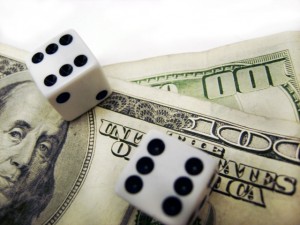According to a recent comment on this blog, I’m full of it. Apparently, the author thinks I pulled the following statement out of my butt…
The reality is that the typical mutual fund investor has actually been losing 1 percent per year over the last 20 years, after adjusting for inflation.”
 The statistic comes from the respected research firm, Dalbar, Inc., in its 15th annual study of mutual fund investor behavior. The study measures the returns investors actually get, not the returns they wished they got.
The statistic comes from the respected research firm, Dalbar, Inc., in its 15th annual study of mutual fund investor behavior. The study measures the returns investors actually get, not the returns they wished they got.
According to Lou Harvey, the president of Dalbar, the study once again revealed that
“investor returns lag what performance reports and prospectuses would lead one to believe is achievable. While those returns are theoretically achievable, the reality is that investors are not rational, and make buy and sell decisions at the worst possible moments.”
Let me paint a picture of how this happens: Lets say you do what the author (who calls himself “David K.”) of the rather nasty blog comment suggests and buy “simple index funds” and hold them for twenty years.
Now, it should be noted that “David K.” did not suggest he had actually managed to follow his own recommendation, nor did he offer any brokerage account statements that show he had the wisdom and patience to hold onto an index fund for 20 years. (I, on the other hand, do show my own Bank On Yourself policy statements as proof.)
That’s not the point, but let’s say you did buy an index fund 20 years ago. When the dotcom stocks were flying high a decade ago, most investors jumped on that bandwagon. Index funds that tracked the overall market were no longer in fashion. Investors loaded up on tech stocks and mutual funds, ultimately suffering deep losses when the internet bubble burst.
Afraid of losing even more, many investors sold off their internet stocks. This is in spite of their “resolve” not to try to time the market. Many were also too scared to get back into the market, until they had already missed the big upswing, which wasn’t even in tech stocks.

This is the kind of pattern human beings have followed for all of eternity
A few years ago, it was real estate. In the 1600’s in Europe, it was tulip bulbs, of all things.
Since the current bear market started, most of the otherwise intelligent people I know sold off their stocks and mutual funds. It has nothing to do with intelligence. We humans are motivated by fear and greed, which is why you will find very few people who actually did hold on for two decades to an index fund that tracks the overall market.
So, is it just us “regular” folks who do this?
Nope! 80% of all mutual funds underperform the overall market (source: The Motley Fool), and 80% of all investment advisory services underperform the overall market (source: The Hulbert Financial Digest).
So the scenario that David K. paints that could have given investors a 6% return over the last 20 years happened for only a small percentage of people.
If even most experts can’t do it successfully consistently, it’s not a science – it’s a crapshoot.
David K. also conveniently ignores the fees charged by mutual funds and the wealth-killing management fees you get charged in 401(k) plans, etc. (60 Minutes recently did an expose on this.)
The reality is that if you’re in a higher tax bracket, you’d need to get a 7-8% return before taxes to equal the net return you could get in a Bank On Yourself policy. (Under current tax law, you can take retirement income from a Bank On Yourself policy with little or no taxes due.)
And when you Bank On Yourself, you can do that with no luck, skill or guesswork required, and you can do it without the stress and the nail-biting ups and downs of stocks, real estate and other investments.
David K. insists “you simply are not going to get big returns without considerable risk.” Like most Americans, David has been brainwashed (especially by Wall Street) into believing we must accept risk and volatility to grow a sizable nest-egg.
It’s a lie!
To respond to David’s comment that if he were in Suze Orman’s shoes and had 25 million dollars, he “wouldn’t mess around with the stock market either” – this was in response to an earlier blog post where there was a link to the New York Times interview where Suze said she only invests 4% of her liquid assets in the stock market because “if I lose a million dollars, I don’t personally care.”
I will say again that I believe financial gurus like Suze, Dave Ramsey and others have some very good advice and have helped many people turn around their financial lives.
But I’ve got news for David K. – Suze Orman did not make her fortune by taking the risks in the stock market she urges the rest of us to take. She made her money through endorsements, TV appearances and book and other product sales.
Would you eat in a restaurant where the chef eats their own cooking and then throws it up?
If not, maybe you should think twice about following advice that the advice-giver can’t stomach themselves.
Stay tuned, because I will soon be revealing the details of a shocking new report on the long-term results people have been getting when they invest in the stock market.


Hi! Good post! I needed to know such kind of information to update myself. I’m into Real Estate and need to know what’s new in the market. Thanks for the information.